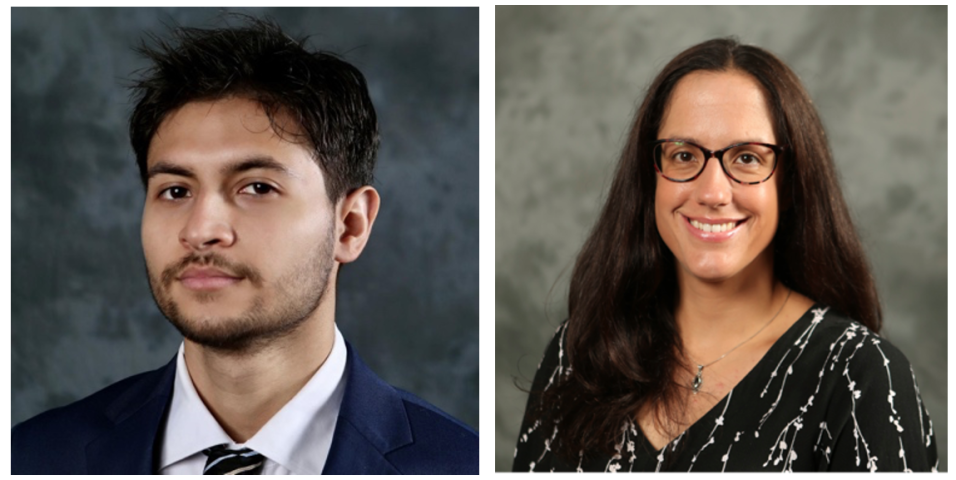Audience

Assistant professor of Biology and Neuroscience Sarah Latchney and Brayan Ruiz Lopez ’24 recently published an article titled, “Neuronal deletion of phosphatase and tensin homolog in mice results in spatial dysregulation of adult hippocampal neurogenesis,” in the journal Frontiers in Molecular Neuroscience.
The human brain contains around 88 billion neurons, which are created through a process called neurogenesis. Exactly how, when, and where neurogenesis occurs in the brain is still not fully understood. Dr. Latchney’s research group is helping to find answers by studying neurogenesis in the hippocampus, one of just a few brain regions that can create new neurons during adulthood.
The present study, co-authored with Brayan Ruiz Lopez ’24, focused on a neurogenesis signaling molecule called Pten (short for phosphatase and tensin homolog deleted on chromosome 10). Using a mouse model, previous studies found that the absence of Pten leads to an atypical increase in adult neurogenesis. Latchney and Ruiz Lopez’s study found that mice missing the Pten gene not only had more neurogenesis than usual, but also that the neurogenesis happened in sub-regions of the hippocampus where it does not usually occur. The findings were unique to male mice, as females did not display the same atypical patterns of neurogenesis.
Could too much neurogenesis be a problem for the brain? Latchney and Ruiz Lopez’s findings suggest important implications for understanding seizures and epilepsy. Mice lacking Pten are prone to developing seizures, and atypical neurogenesis within the hippocampus is a characteristic feature in the progression of temporal lobe epilepsy. Sometimes, seizures can cause neurogenesis to happen in atypical locations. When this happens, newborn neurons can integrate abnormally into existing neural circuits, rewiring hippocampal neural networks and leading to more development of spontaneous seizures. As Dr. Latchney summarizes, “The findings from the new study contribute to a more comprehensive understanding of how hippocampal neurogenesis may be spatially dysregulated in models of temporal lobe epilepsy.”
Brayan Ruiz Lopez ’24 worked with Dr. Latchney for 2 ½ years to carry out the study. He sectioned nearly 50 mouse brains, used cell staining methods to identify cells undergoing various stages of neurogenesis, and quantified the number of neurons undergoing such processes. He carried out the study with the support of a 2022 Seahawk Undergraduate Research Fellowship (SURF).
“I enjoyed the one-on-one attention and guidance that I received from Dr. Latchney,” said Ruiz Lopez. “I am very grateful to have formed part of this project as I developed the skills to feel independent and successful in a laboratory setting. Dr. Latchney takes on individualized care for her students. Throughout the entirety of the project, she reminded me of the importance of every step and even helped me get off-campus internships to continue honing my skills.” Ruiz Lopez recently presented his work at the 2023 Society for Neuroscience conference held in Washington, D.C. After graduation, he plans to continue researching brain development to advance our knowledge of how neurological conditions affect brain structure and what treatments can be developed for these conditions.
